Terry Castle writes reviews out of appreciation of another author’s work. And has fun with their enthusiasms and failings. “Essays are the great form of writing, since the eighteenth century. Essay is my form.” Reading fiction and memoir helps us learn to “read” other people and ourselves, to survive in society. “I believe in geniuses. Never mind their lives.” Vera Brittain’s Testament of Youth is “masterful”. (I’ve started reading it.)
Alison Bechdel wanted to “archive a generation’ with the comic strip Dykes to Watch Out For. She likes it that her first graphic memoir, Fun Home, exists to be taught in colleges – that it exists to be banned in one, as it has been recently, is also good in that banning it reinforces its existence. Her drawing style has been influenced by the internet, where she can find an image of “anything” and draw it accurately. There is something cathartic for her in having actual documents, such as old passports and letters, they meet her desire for something actual, a chunk of “truth.”

Kei Miller is Jamaican. He lives and teaches in Edinburgh. I loved his session. He writes essays, poems, novels, everything except plays. “I have the urge to say a lot and every form doesn’t suit everything you want to say.” And, “Essays are for when I get angry about things.” He’s interested in maps, what they show and what is not seen – reality is multiple and contradictory. I’ve bought his novel, The Last Warning Woman and am looking forward to reading it.
New Zealand poet, novelist, journal editor and screenwriter Anne Kennedy, grew up in Irish New Zealand, which she suggests is different from English New Zealand. Ideas, “rumble along for years until they make the page.” She sees making art as testing boundaries and departing from the known. One of the concerns she recognises in her writing is what she called “the agony of plenty,” – people’s concerns, miseries, anomie, when they have enough in material terms. Her novel, “The Last Days of the National Costume,” is on my reading list.
Elizabeth Gilbert describes the protagonist of her The Signature of All Things, Alma Whittaker as, “neither rescued nor ruined,” but “resilient.” She is, however susceptible to disappointment. EG is no fan of “the fetishising of suffering as a precondition for art.” Perfection is seldom if ever achieved, she says, and “done is better than good.”
The Pacific Journeys (I wrote about the book here) session involved eight people, which could have been a disaster, or at least a disappointment, but it worked well. The two editors, Lloyd Jones and Julianne Schultz chatted for a bit about commissioning the pieces and the desirability of more literary crossover between New Zealand and Australia, where Pacific Journeys was published by Griffith Press. Then six contributors each had four minutes to talk about the piece they had in the book. I especially liked what Ashleigh Young said, referring to her essay about hikikomori, young Japanese people who shut themselves in their room, apart from all of the world except the internet. She talked about social anxiety and an impulse to turn inwards, what isolation might give to a person.
I think of Writers’ week as my biennial five days of total immersion in a world of writers. Some years I find an author of whom I have never before heard whose work becomes a source of ongoing delight. It was how I found Jenny Diski. This year I have hopes of Kei Miller in that regard.
And now, Testament of Youth.














